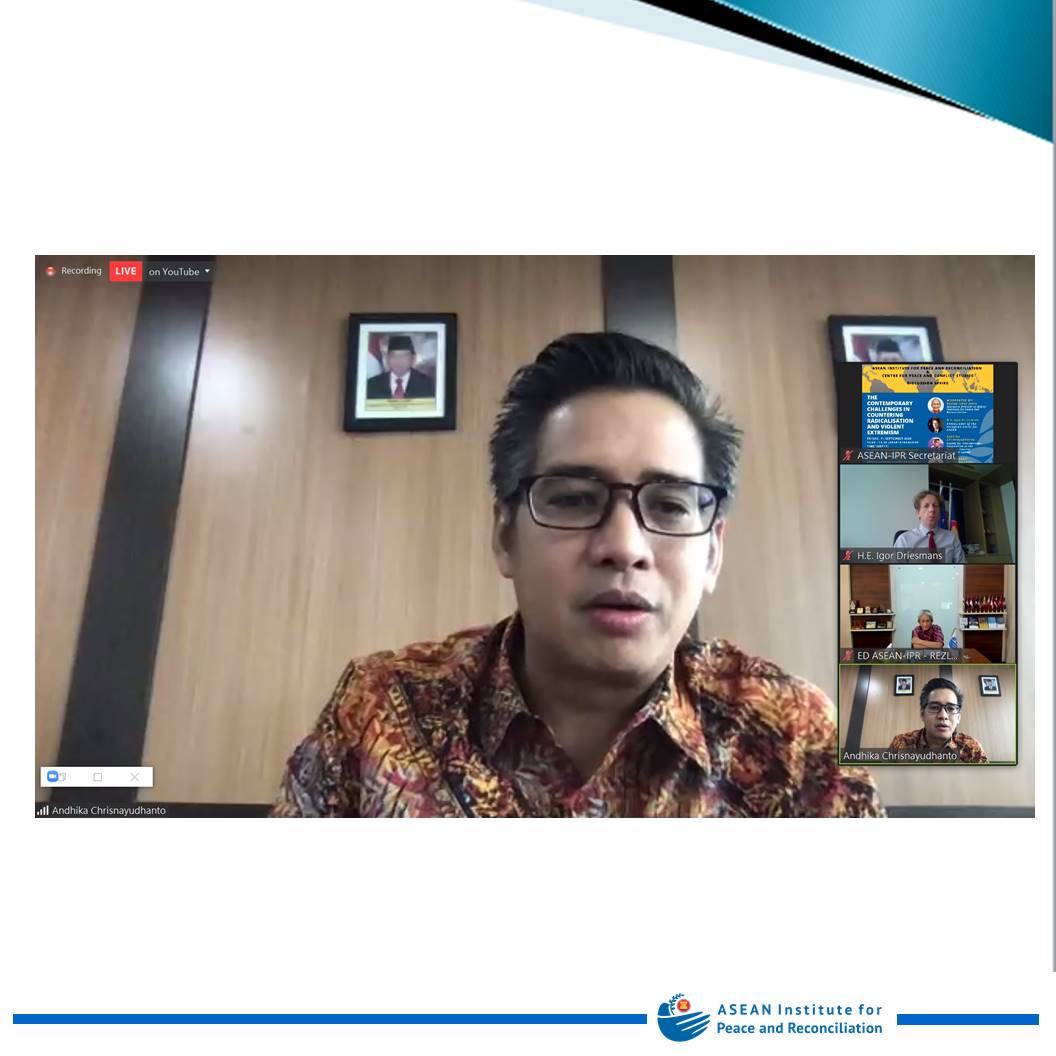ASEAN-IPR Discussion Series: the Contemporary Challenges in Countering Radicalisation and Violent Extremism
ASEAN-IPR UPDATE
ASEAN INSTITUTE FOR PEACE AND RECONCILIATION DISCUSSION SERIES:
THE CONTEMPORARY CHALLENGES IN COUNTERING
RADICALISATION AND VIOLENT EXTREMISM
11 September 2020
ASEAN-IPR YouTube Channel
The ASEAN Institute for Peace and Reconciliation (ASEAN-IPR), in collaboration with the Centre for Peace and Conflict Studies (CPCS) convened a Webinar on 11 September 2020, taking on the theme “The Contemporary Challenges in Countering Radicalisation and Violent Extremism.” This Webinar is the third part of the ASEAN-IPR Discussion Series that brought together more than one-hundred (100) participants coming from ASEAN Member States, ASEAN bodies/sectoral bodies/entities, partners, media, civil society groups, as well as other stakeholders – whether through the Webinar’s platform, or through the Institute’s YouTube Channel.
The theme of the Webinar aims to identify and discuss the contemporary challenges in countering radicalisation and violent extremism; as well as how preventive and responsive strategies need to adapt in order to curve such challenges.
The discussion was moderated by Mr. Rezlan Ishar Jenie, Executive Director of ASEAN-IPR. Two Speakers shared their views on the topic, namely: H.E. Igor Driesmans, Ambassador of the European Union (EU) to ASEAN, and Mr. Andhika Chrisnayudhanto, Deputy for International Cooperation at the National Counter Terrorism Agency of the Republic of Indonesia.
The Speakers discussed action plans as well as strategies to counter radicalisation, violent extremism, and terrorism, both from the perspective of global and regional. At the global level, the Speakers recalled the United Nations Plan of Action to Prevent Violent Extremism which highlights seven (7) priority areas namely: (i) Dialogue and Conflict Prevention; (ii) Strengthening Good Governance, Human Rights and the Rule of Law; (iii) Engaging Communities; (iv) Empowering Youth; (v) Gender Equality and Empowering Women; (vi) Education, Skill Development and Employment Facilitation; and, (vii) Strategic Communications, including through the internet and social media.
At the regional level, the ASEAN Plan of Action to Prevent and Counter the Rise of Radicalisation and Violent Extremism (2018-2025), which was adopted in 2018, identified four (4) pillars, namely: (i) Prevention of Radicalisation and Violent Extremism; (ii) Counter Radicalisation and Promote De-radicalisation; (iii) Law Enforcement and Strengthening National Legislation related to Countering Radicalisation; and, (iv) Partnership and Regional Cooperation. In comparison, the European Union adopted a Counter-Terrorism Strategy that is based on four (4) pillars, namely: Prevent, Protect, Pursue, and Respond.
Dr. Emma Leslie, Executive Director of CPCS acted as discussant in the Webinar, highlighted the successful efforts in the last twenty (20) years in bringing governments and civil society, think tanks, as well as research institutes closer – to exchange information and share analysis with regards to countering radicalisation, violent extremism, and terrorism. Further enhancement is needed to strengthen these sources even more, considering that terrorism have been infiltrating in more domestic situations, which makes efforts for dialogue and conflict prevention more challenging.
For full view of the Webinar, please visit ASEAN-IPR’s YouTube Channel, or refer to the following link: http://tiny.cc/asean-iprwebinarseries. The fourth part of the Discussion Series is scheduled for Tuesday, 9 October 2020, with the topic of climate change and its impact on peace. Be sure to subscribe to the ASEAN-IPR’s YouTube Channel, and follow our social media for latest information and/or updates on our activities.
*******

